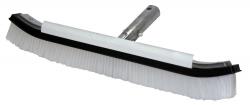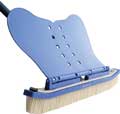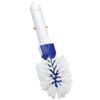Why Does a Pool Need to be Brushed?
Brushing is important. There can be dead spots in the pool circulation where a boundary layer can form adjacent to certain spots of the pool surface. While the overall Cl reading can be acceptable, these boundary layer spots can be low in Cl and algae can develop.
Algae has a biofilm that protects it. Brushing the pool surfaces breaks the algae's biofilm and allow the chlorine to attack it. That is why frequent brushing during the SLAM Process is important to its success. All pool surfaces should be brushed at least weekly during normal maintenance.
Do Pool Cleaners Eliminate the Need to Manually Brush the Pool?
Pool robot cleaners do a pretty good job. You still need to manually brush some surfaces, along stairs, ledges, corners, etc.[1]
Wall Brushes
A pool owner should have at least one good brush.
Basic 18" Wall Brush
A basic 18" Nylon pool brush is fine for smaller pools. This brush has a spoiler fin to hold tight to walls.
Reinforced 24" Wall Brush
If you have a larger pool then a 24″ wall brush with nylon bristles and a reinforced metal spoiler fin may save you time and last longer.
Whale Brush
If you find it difficult to Keep the brush against the pool walls you may find the Wall Whale Brush makes brushing an easier and more enjoyable task. Just like a spoiler on a car, the tail on the Wall Whale works like a spoiler to hold the brush firmly against the pool surface. With the Wall Whale, you simply push down with one hand and the force of the water against the Wall Whale creates pressure between the brush and pool surface. As long as the brush is moving, even with the pole fully extended, the Wall Whale will hold the brush firmly against the pool surface.
SweepEase Pool Brush
SweepEase has a family of pool brushes with aerodynamic shapes to use water to force the brush to the walls and floor with 5-10 pounds of pressure. For those who find the Whale Brush too difficult to handle the SweepEase brush may work.
Tips
- The nylon bristles on pool brushes get broken down by UV rays if you leave them sitting outside
- All brushes tend to shed bristles eventually. When a brush begins losing bristles it is time to replace it.
- If you find little white sticks in your pool cleaner it is likely your pool bristles coming loose
Specialty Brushes
Corner Brushes
A smaller brush is handy for brushing the corners that a large brush can't get into and for spas. You can use it to brush the skimmer throats, all the corners on steps and benches and under the waterfall. You can find the brush pictured on Amazon and in pool stores.
Stainless Steel Wire Brushes
You should only use a wire brush for stubborn black algae spots. Fresh finishes need to stick with nylon the first year.[2]
Brushes with stainless steel bristles are rough on a pool surface. Here is a thread where a member damaged their pebble finish using acid and a 6" wire brush.
If your pool is made or resin or fiberglass steel bristles can leave scratches on the surface.
Brushes with stainless steel bristles are often labeled as "algae brushes". Brushing and filtering alone does not fix an algae problem. The TFP SLAM Process and brushing with nylon bristle brushes to break the algae biofilm is what is needed and easier on the surface of the pool.
Stainless steel bristles do not deteriorate from the sun the way nylon bristles do. However, brushes shed their bristles and can leave sharp sticks of metal in the pool.
These are some products members have liked:[3]
- SweepEase 654367706305 AlgaeZilla 10" 100% SS Bristle Algae Brush, Yellow
- Daveyspa Heavy Duty 18" Aluminum Swimming Pool Brush Stainless Steel Wire Bristle
Pool Poles
You need a good pole to connect to your brush. The JED Pool Tools 50-560-16 Professional Deluxe Anodized Telescopic Pole, 16-Feet has recived good comments.
.




